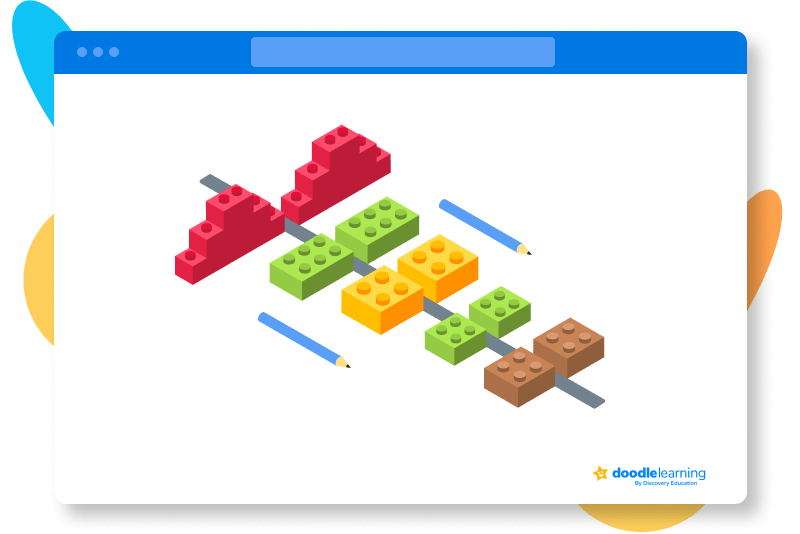


Author
Mhairi Sim
Published
August 2025


Key takeaways
Table of contents
In Year 4, learners are developing their curiosity and capacity for abstract thinking. In addition to this, they’re also becoming more independent mathematicians, selecting and applying their knowledge to solve increasingly complicated problems.
Maths this year can be challenging in many ways for our kiddos, with concepts like fractions and decimals taking a marked step up in difficulty. However, fun Year 4 maths activities and games can make a difference to motivation levels and ensure that learning these concepts is a positive experience for them.
In this post, we’ll recap the Year 4 maths curriculum and share eight super Year 4 maths activities to try out with your learners. We’ll also share some fantastic (and free!) resources to support Year 4 maths learning, as well as answer some frequently asked questions.
As promised, here are our top Year 4 maths activities that blend learning with fun, hands-on and creative learning experiences:
1. Times table treasure hunt
Hide cards with multiplication and division questions around the classroom or house, and let children hunt down the cards and solve the problems. This activity is great revision ahead of the Multiplication Tables Check at the end of Year 4!
2. Budgeting challenge
Give children a budget and let them plan something fun, such as a pretend birthday party, a day out, or a shopping list for a dinner party. They’ll need to use their estimation skills along with methods of addition and subtraction to build their shopping lists while keeping under budget. You can use food catalogues, or incorporate the activity into your ICT time and use online shopping.
3. Hands-on line of symmetry
Place some masking tape or a meter stick on the floor or table as your line of symmetry. Kiddos can work in two teams (one on each side) or alone to ensure that what is on one side is reflected on the other. They can use anything to create their images – LEGO, Mega Bloks, 2D shape tiles, 3D shapes, pencils, or pens.

4. Baking and mixing
Pick one of these drinks or no-bake recipes and get making with your kiddos! Encourage them to select the appropriate measurement tools and to weigh, scoop, and pour ingredients accurately. You can add elements like cutting ingredients or garnishes into 1cm chunks to bring in extra measurement practice, too!
5. Class or family survey
Question family members or classmates about their favourite meals, favourite animals, shoe size, or birth month, then turn the results into a graph or chart. Discuss and let them choose the best way to display the data, then have them draw their graph or chart.
6. Guess my number
One player picks a number, then others ask a series of ‘yes’ or ‘no’ maths questions such as “Is it a multiple of 5?”, “Is it a prime number?”, “Is it an odd number?” until they guess correctly. This game is a great way to fill five minutes before break or hometime while reinforcing key maths concepts!
7. Maths relay
A maths relay is lots of fun and can get quite competitive as players work in teams and race to complete a set of questions. Questions can be anything – multiplication facts, addition/subtraction calculations, measurement conversions – take a look at this example to see how it works. Quickfire activities like this improve learners’ fluency with maths concepts and build confidence with repetition.
8. DoodleMaths app
Gaming apps are a super way to get kids to learn and revise maths skills, as they feel like they’re getting away with just playing games and don’t realise they’re actually learning! The DoodleMaths app is recommended by schools, parents and learners for its engaging, curriculum-aligned content and a proven track record for boosting academic achievement.
As they continue with the KS2 maths curriculum, in Year 4, learners will further develop their skills by learning to:
Games and activities, like those we suggested above, work to reinforce key concepts of the Year 4 maths curriculum in a few ways:
Repetition is key to improvement in maths. These types of activities encourage learners to repeatedly put many different maths skills into practice throughout. This repetition reinforces these concepts without being boring in the way completing a list of the same sums on a worksheet would be!
Practising real-world skills like budgeting and baking puts maths into perspective for kiddos. These activities help them to understand how maths can help them in their day-to-day lives and show them why it’s important to learn these skills.
Kids will enjoy playing fun Year 4 maths activities and games over and over, and this helps them to develop their maths fluency – the ease with which they can use certain skills. The more fluent kids are, the more confident they’ll be as they apply their knowledge.
Unlock unlimited maths questions
Put your skills to the test with fun exercises + maths games that are proven to boost ability!
Try DoodleMaths for free!
Select a year group
Who doesn’t love a freebie? These free and printable maths resources are perfect for some at-home revision or to use in the classroom with your Year 4 learners!
In addition to these resources, it’s a great idea to put together a little toolkit to help Year 4 kiddos with their maths learning. Here are some recommendations that you can print and add to your learner’s Year 4 maths toolkit:
Activities, like the ones we’ve shared above, that combine fun and creativity with the learning and reinforcement of maths skills are best. Try to take learning off the page and use hands-on activities wherever possible, instead of textbooks and worksheets.
Using game-based activities works well as they get kiddos excited about learning, and the competitive nature of games encourages them to want to improve. Activities that incorporate real-world skills and scenarios are also very successful because they show kids how they’ll use what they’ve learned beyond the classroom.
Absolutely – the DoodleMaths app is a super resource that can be used in school, at home, or both! The app uses responses to a baseline assessment and consequent activities to devise and update a personal programme of activities and games for each individual user. There are hundreds of Year 4 maths activities that your learners will love.
In addition to our app, our DoodleLearning YouTube channel has lots of easy-to-follow videos explaining core maths concepts, like this one explaining equivalent fractions.

Parents, sign up for a DoodleMaths subscription and see your child become a maths wizard!

Book a chat with our team
If you’d like to use Doodle’s browser version, please visit this page on a desktop.
To log in to Doodle on this device, you can do so through our apps. You can find out how to download them here: